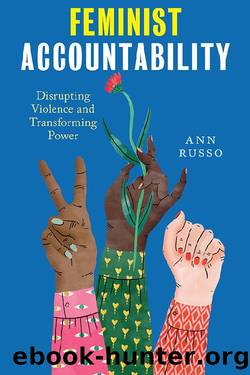Feminist Accountability by Ann Russo

Author:Ann Russo [Russo, Ann]
Language: eng
Format: epub
Tags: SOC032000 Social Science / Gender Studies
ISBN: 9780814777152
Publisher: NYU Press
Published: 2018-12-03T23:00:00+00:00
Storytelling, Collective Interventions, and Community Organizing
Whether or not the outcomes are successful, nuanced, or contradictory, sharing everyday intervention stories and creating the space to critically explore the strategies for intervention are imperative. They make the spectrum of options available more imaginable, and they build the capacity and skills for implementing those options. As Weingarten writes, “We need examples of behavior we can emulate, that feel bite-size and doable. People who feel competent act more to help others. We need to create histories in our families, communities, and nations not just of heroic actions but of everyday ordinary actions that help.”13
Creative Interventions, in Oakland, California, initiated the Storytelling and Organizing Project (STOP) just for this purpose. The mission of Creative Interventions, founded by Mimi Kim, was “to create community-based options for interventions to interpersonal violence,” with a focus on developing “collective, creative, and flexible solutions, which take into account the realities and resources of each situation and community.”14 One of STOP’s projects was to record and circulate stories of collective interventions wherein family members, friends, and/or community members intervened to disrupt or stop interpersonal violence: “from Korean and Latina mothers protecting their children from physical and sexual harm, youth standing up for a friend who had been sexually abused by someone in their neighborhood, a mother who taught her son not to rape, to a Maori family coming together to stop a father from beating his son.”15 The stories are of collective, community-based responses to violence that do not rely on external authorities (e.g., police, social services) for intervention. Rather than conceptualizing community accountability as “new,” Kim argues that community-based interventions are happening all of the time across generations, particularly in communities of color; she writes, “Our failure of imagination was not rooted in a lack of examples, but rather in the devaluing of community-based actions.”16 Often the only community-based interventions publicized are those that involve violent vigilantism, and the impact of this publicity is to further dampen people’s willingness to intervene; thus, people are even more reluctant to respond themselves and more likely to see the police as the only option. And yet the police themselves are often involved in active oppression and violence, particularly against low-income and poor people of color, including women and queer and trans people, and so many people do not see them as an option either.
The stories told through STOP are powerful illustrations of how family members and friends draw on their relationships, experiences, and knowledge and work together to prevent and/or respond to violence within their own lives and communities. They do not present the collected stories as model answers or as templates for future action. Instead, they encourage community activists and educators to use the stories as a stimulus for critical reflection, dialogue, inspiration, and imagination. One of the stories offered is by Phoebe and is about a collective response to racist neighborhood violence. Upon finding out that their friend, a Black woman, had been attacked by seven white men on a busy
Download
This site does not store any files on its server. We only index and link to content provided by other sites. Please contact the content providers to delete copyright contents if any and email us, we'll remove relevant links or contents immediately.
The Rules Do Not Apply by Ariel Levy(4969)
On the Front Line with the Women Who Fight Back by Stacey Dooley(4873)
The Lonely City by Olivia Laing(4802)
Bluets by Maggie Nelson(4556)
The Confidence Code by Katty Kay(4260)
Three Women by Lisa Taddeo(3434)
Not a Diet Book by James Smith(3428)
Inferior by Angela Saini(3316)
Confessions of a Video Vixen by Karrine Steffans(3309)
A Woman Makes a Plan by Maye Musk(3254)
Pledged by Alexandra Robbins(3179)
Wild Words from Wild Women by Stephens Autumn(3153)
Nice Girls Don't Get the Corner Office by Lois P. Frankel(3044)
Brave by Rose McGowan(2824)
Women & Power by Mary Beard(2767)
Why I Am Not a Feminist by Jessa Crispin(2760)
The Girl in the Spider's Web: A Lisbeth Salander novel, continuing Stieg Larsson's Millennium Series by Lagercrantz David(2722)
The Clitoral Truth: The Secret World at Your Fingertips by Rebecca Chalker(2720)
I Who Have Never Known Men by Jacqueline Harpman(2670)
